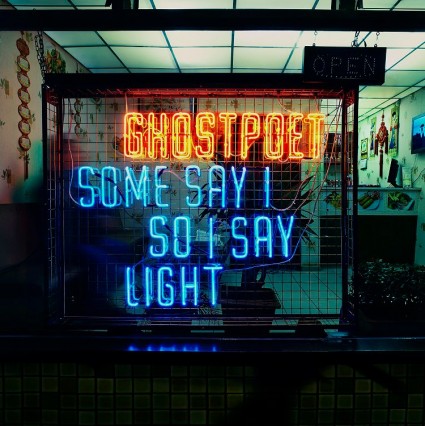Ghostpoet generally bristles when he’s described as a rapper, and with good reason. While it would be ludicrous to ignore the influence of hip-hop, his sound sucks in influences from a far wider spectrum of sources. On ‘Cash and Carry Me Home’, the standout track from his Mercury-nominated debut ‘Peanut Butter Blues & Melancholy Jam’, he didn’t so much rap as slur over a pumping 4/4 beat, like someone trying to find their way out of a club after one too many JD & Cokes. Similarly, tracks like ‘Liiines’ were as much anthemic indie as anything else.
His new album, which is the recipient of a rich layer of studio lacquer in comparison to the “shitty home production” of his debut, makes him even harder to categorise. There are barely any hip-hop beats here, but you can hear everything from Joy Division to Burial across its 11 tracks, which display an attention to detail that indicates many red-eyed nights behind a mixing desk, tweaking tracks and tweaking out.
‘Cold Win’ is a strong opener, a gloomy strut of android two-step which sounds way too futuristic to actually be about the mundanity of working in a chicken shop, while ‘Them Waters’ is similarly moody. Roots Manuva comparisons have always dogged Ghostpoet, and there are definite echoes of Lord Gosh’s darker work on ‘Awfully Deep’ here, although Ghostpoet is more the tense anxiety that precedes a breakdown rather than the drug-damaged depression that follows it, with the admittance that: “If I stop to think, it may open floodgates that no key can ever lock”.
While those gates thankfully appear to have remained closed, the ones in front of the studio were clearly wide open, judging by the stream of guests who’ve poured through them. Lucy Rose exchanges some melancholy vocals on the delicate ‘Dial Tones’, while legendary Afrobeat drummer Tony Allen contributes a jazzy rhythm to ‘Plastic Bag Brain’, a track which, although fairly tasty, does sound a bit out of place here, almost like an Alt-J take on highlife. Lead single ‘Meltdown’ also features Monitors favourite Woodpecker Wooliams, who adds a heartbroken resignation to a song about a disintegrating relationship.
It’s the less radio-friendly moments which are really interesting though. ‘Thymethymethyme’ has a time signature even weirder than it’s title (it feels like eleven-ish beats to the bar, which is mental). Ghostpoet’s wordplay is generally more about space and atmosphere than devastating delivery, but managing to keep a flow over this rhythm is a testament to his talent. Lyrically it’s another doomed relationship scenario, although Ghostpoet’s tangential lyrical style means it also ends up covering the stresses caused by expensive London rents.
‘Sloth Trot’ is apparently his “attempt at experimental, psychedelic rock”, although it sounds more like Boards of Canada remixing Radiohead’s ‘Pyramid Song’; a languid nod-out track where even the odd bit of jerky discordant guitar manages to sound utterly chilled. The similarly slow-paced ‘Dorsal Morsel’ comes close to stagnation, but even here a sudden electronic arpeggiation sets it ticking along with the smooth accuracy of a bloody expensive watch.
Piano takes centre-stage on a couple of the album’s best tracks. A fantastically doom-laden ivory riff sparks off the brilliant ‘Msi Musmid’, with references to Skodas and dim sum (read the title backwards) highlighting Ghostpoet’s refusal to abandon everyday concerns (“If I try put on a facade or an alter-ego, I’ve got to keep that up for five, ten years – I don’t want to do that!” is how he put it in a recent interview). It finishes with a digital cacophony that sounds like everyone’s internet connections jamming at once, before the gentle piano hook of ’12 Deaf’, which also features sweetly soft vocals from The Invisible’s Dave Okumu, takes things down a notch.
Closing track ‘Comatose’ sums up all that’s excellent about this album. Just as you think it’s about to float away like dust caught in a beam of sunlight, a wonderfully manic electronic rhythm bursts in with a string quartet, bringing things to a glorious conclusion. In keeping with the general mood it’s also pretty dark, featuring not only hints at suicide but also the most memorable verse on the album:
“The sip tastes sweet so I have a whole glass
A few days pass and I’ve had a vineyard
Think I’ve got a problem but the mirror says ‘no’
And the wallet says ‘yes’ – more drinks I guess”
Asked to put the record in a nutshell, Ghostpoet responded: “It’s a chance for me to mumble over quirky sounds”. It’s something of a humblebrag but it’s also bluntly accurate in terms of the specific niche he inhabits. His Twitter account, as well as providing informative dispatches on the conversational habits of East London cabbies, often functions as a sounding board for him and his followers to exchange music tips, while his NTS radio show demonstrates a roving taste.
It’s this obvious love of music that permeates ‘Some Say I So I Say Light’ and makes it such an attractive proposition to fellow enthusiasts. Mumbling quirkiness never sounded so good.






Follow us
Follow us on Facebook Follow us on Twitter Follow us on Google+ Subscribe our newsletter Add us to your feeds